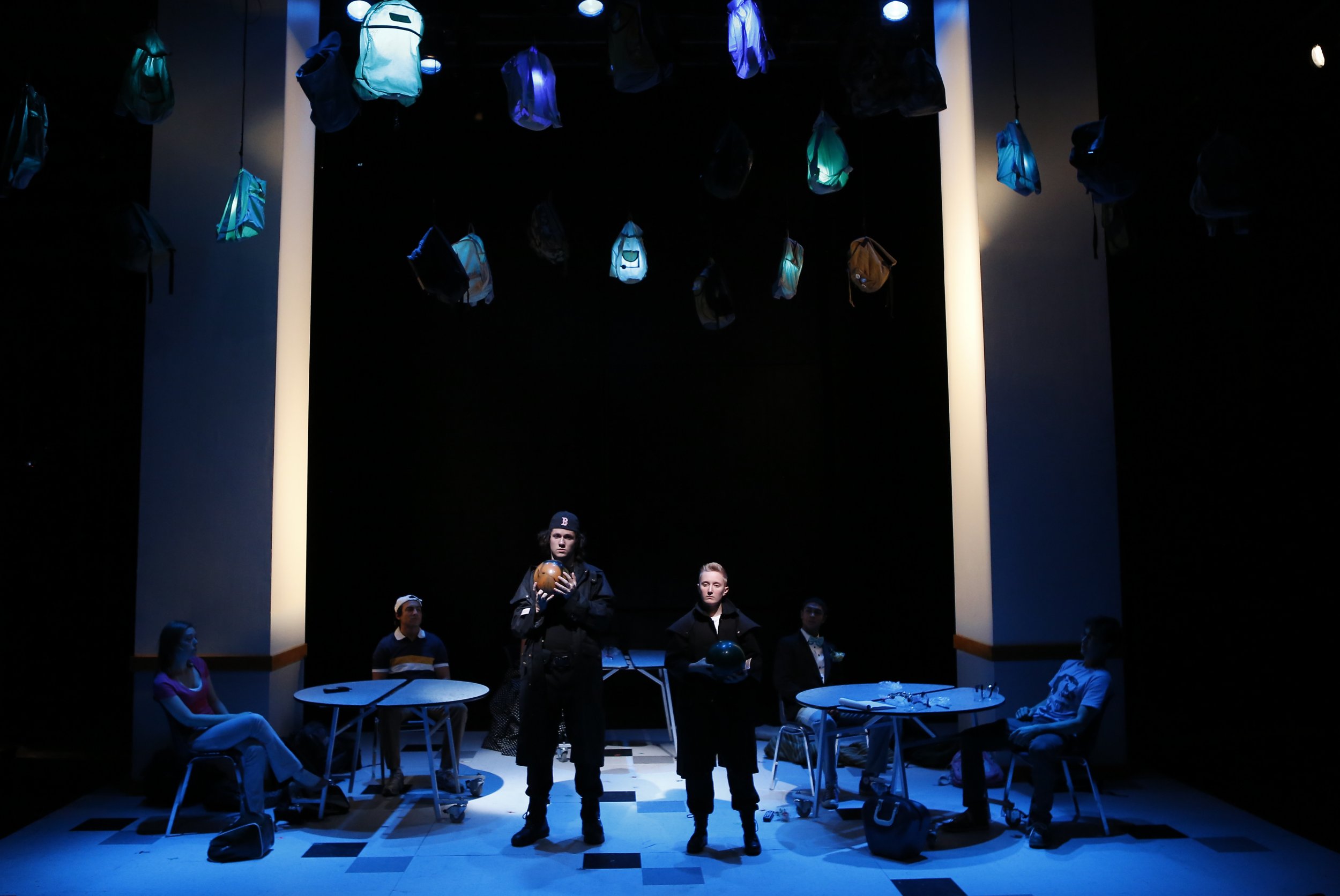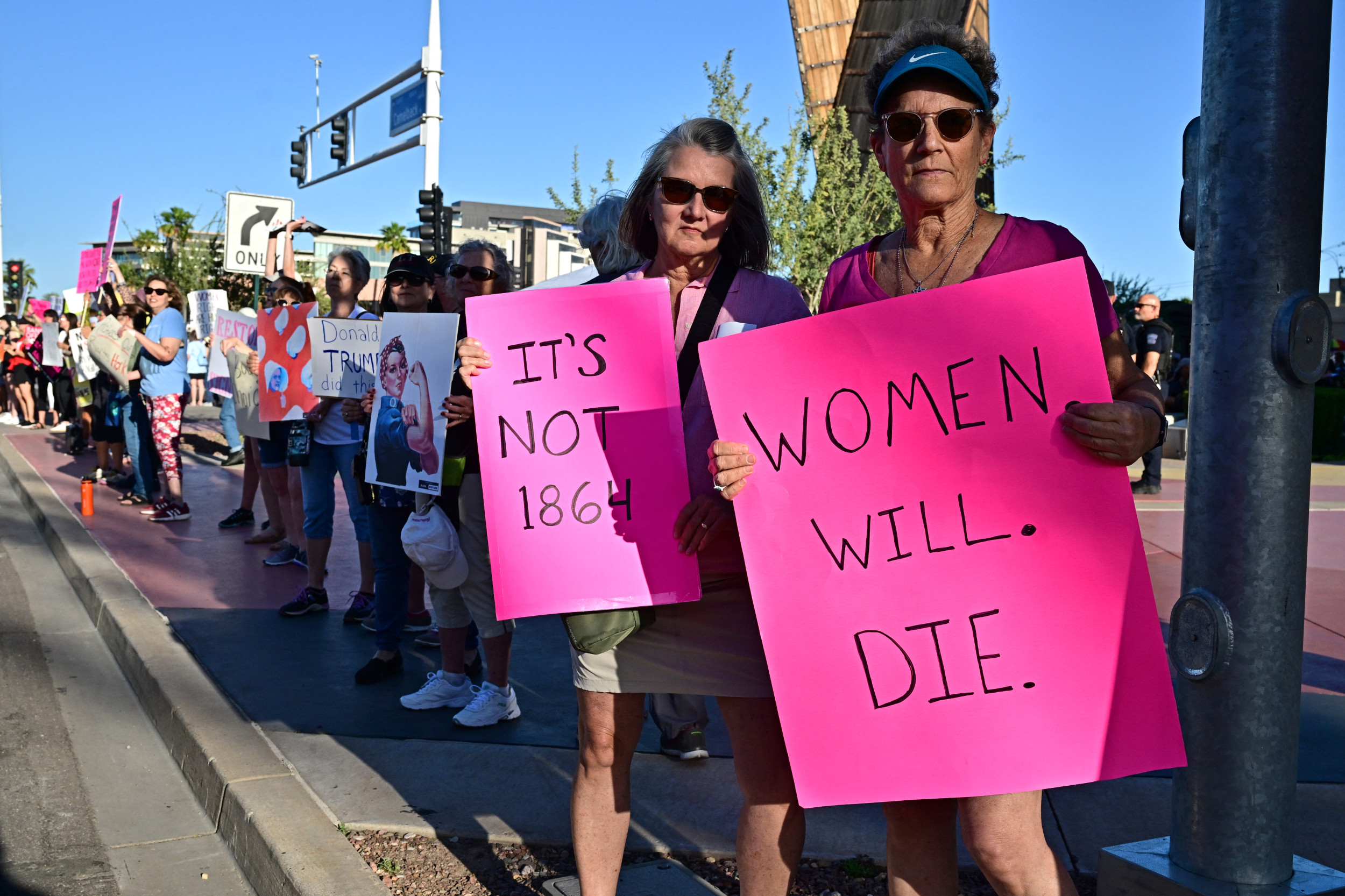
"On three," one of the boys says. His voice reeks of determination. The bright blond spikes of his hair stand out against a long coat, pants, and heavy-duty boots, all of them black.
"I… I… Okay," says his partner, distraught under his own black garb.
Above them, a constellation of illuminated backpacks dangles from the ceiling, hanging over cafeteria tables ensconced in shadows.
"Eric Harris's 'Guns in School' essay," the first reads, drifting away from the scene to recall an assignment, which along with journal entries and poems the two have returned to throughout the play, moving nimbly between reality and introspection. "More and more we hear of shooting sprees and rampages on the news," he says. "Almost any school shooting can be prevented in some way or another, we just have to spend the necessary time and money to figure out how."
"What'd you get on it?"
"A 92."
Moments later the shooters begin counting. The room goes dark. The audience knows what happened next.
The Erlkings, a play written by Nathaniel Sam Shapiro, depicts onstage the infamous shooters, Eric Harris and Dylan Klebold, who on April 20, 1999, killed 13 people and wounded more than 20 others at Columbine High School before committing suicide. Theirs was one of the deadliest shootings in U.S. history.
The off-Broadway play, directed by Saheem Ali, is based on an FBI report—a nearly 1,000-page compendium of the boys' own writings and other evidence—as well as additional sources, like the many home videos Harris and Klebold made. It opens Sunday at the Beckett Theatre after a week of preview performances, with Em Grosland and James Scully in the leading roles.
In his playwright's statement, Shapiro says he began researching Columbine after the December 2012 school shooting in Newtown, Connecticut, and calls Columbine a "watershed moment" for those, like him, who were students in American schools at the time.
"The way we talked about Adam [Lanza] took me back to Eric and Dylan: these were 'monsters' and 'no one could understand how they could do something like this,'" Shapiro writes. He says he pursued the play because "we will never prevent another Columbine by distancing ourselves from those who would perpetrate such an act and by refusing, out of fear, to understand them."

Criticism from Columbine families
When Coni Sanders first caught wind of the project from a segment on the radio, she says she was shocked.
"He's granting the wishes of these two boys who murdered my family," says Sanders, whose father, William "Dave" Sanders, was a business teacher and coach at the school, the only staff member killed in the shootings. "I truly feel that he should have omitted the killers' names." Sanders published a strongly-worded op-ed about the play in the New York Post in early November that grew out of a post she had written on Facebook.
One of Harris and Klebold's objectives was to be remembered forever, she says, and shooters after them have followed suit in an attempt to gain fame and notoriety. So putting Harris and Klebold onstage as Shapiro has, Sanders says, is not only "giving them exactly what they wanted," but could also glorify their actions and encourage others to do the same. In the case of the Virginia Tech shootings, she says, "the boy that killed their families idolized the boys that killed my family."
After Columbine, Sanders became a forensic therapist, working with felons convicted of violent crimes and the mentally ill, "to better understand how Dylan and Eric got to where they are." "I don't see Eric and Dylan as monsters," she says. "I see them as two boys who were broken."
Shapiro insists that his play is meant to educate and prompt discussion rather than to glorify, and that the real-world scenario will help audiences connect to the issue.
"I don't think Eric and Dylan would be so proud to see this play because it shows their humiliation, it shows their vulnerability," he says, adding that the play highlights how Columbine is a more complex story than people would like to admit.
Peter Langman, a psychologist and scholar whose research focuses on school shooters, tells Newsweek: "My concern is that it might portray Harris and Klebold somehow as disaffected contemporary youth rather than portraying them as extreme psychological outliers." While Klebold was slipping deep into a severe depression and exhibiting signs of schizotypal personality disorder, Langman says, Harris "was a very disturbed person, a psychopath.
"This is someone who admired Hitler and the Nazis. This is someone who had fantasies of raping girls he knew. This is someone who fantasized about mutilating human bodies and enjoying it. So he was not an ordinary kid, he was not just an innocent victim of the students who teased him." Langman, who wrote the book Why Kids Kill: Inside the Minds of School Shooters, says "Eric Harris no more represents his generation than Charles Manson represented his."

Based on Columbine
Shapiro is certainly not the first to draw on Columbine for art, or to attract criticism for doing so. Many others have based films, books, and even a video game on the event in Colorado, which while not the first school shooting, remains etched in the nation's collective memory for the scale of destruction Harris and Klebold wrought.
The long list of previous films related to Columbine includes Michael Moore's documentary, Bowling for Columbine; the play-turned-movie Bang Bang You're Dead; the film Elephant; and a parody movie titled Duck! The Carbine High Massacre. A video game called Super Columbine Massacre RPG! sparked outrage after it was released on April 20, 2005, exactly six years after the shootings.
Another play, columbinus, written by P.J. Paparelli and Stephen Karam for The United States Theater Project, premiered in 2005. Unlike The Erlkings, columbinus—which is a mixture of fact and fiction—focuses on the victims as well. In the rampage scene in columbinus, Harris and Klebold are turned away from the audience. "We didn't want it to be about them," Paparelli told the Boston Globe last fall before a 10-show run opened in Boston.
In The Erklings, Shapiro consciously decided to leave out the actual shootings.
"That's the part we know," says Ali, the show's director. "The part we don't know is what happened the year before."
Salli Garrigan was a junior at Columbine High School when Harris and Klebold opened fire. She was in the soundproof choir room when she and her classmates saw other students running outside through the windows. She managed to make it through the auditorium as the fire alarm rang and the sound of ricocheting bullets reached her ears from another part of the school. In the main hall, glass from the doors shattered in front of her before a teacher pointed her toward another route to safety.
Garrigan, who worked in theater in New York before recently moving to Washington, D.C., says on the fence about the idea of The Erlkings. She found out about the play when she saw an audition notice.
"It looks like the playwright was really touched by the Columbine shootings and wanted to write directly about it," Garrigan tells Newsweek. "[But] since it's from the eye of both Eric and Dylan, I feel like the play might enhance the problem even more."
Her ambivalence, she says, is uncommon among those with a personal connection to Columbine. "There is a lot of uproar in the Columbine community," Garrigan says, adding that "sometimes art can be therapy."
Even Sanders concedes that theater is "a fantastic medium for people to understand and feel the emotions around [Columbine]." "I respect what [the playwright] is doing," she says. "I just don't respect how he's going about it."

The shootings problem
In the decade and a half since Columbine, the United States has seen an increase in active shooter incidents, and news of school violence is all too frequent. Just this year, there have been shootings at Reynolds High School in Oregon, at the University of California, Santa Barbara, at Marysville Pilchuck High School in Washington, and at several more colleges and universities as well as middle and high schools.
According to Langman, most adolescents who are en route to committing a middle- or high-school shooting leave warning signs, which he refers to as "leakage." A prospective gunman might "leak" his intentions by making direct threats, telling a friend to stay away on a certain day, or with other hints.
"It's a matter of the people who hear or see them knowing they're warning signs and knowing what to do about them," Langman tells Newsweek. Langman runs training sessions for professionals in education and law enforcement on recognizing and handling warning signs.
Ultimately, Shapiro says, that's the goal of the play as well.
"What we would like an audience to come away with is that these are preventable," he says. "And it's so much more powerful because of who said it, especially as he was plotting it," referring to Harris's 'Guns in School' essay, which closes the play.
The Erlkings—named for German poem Die Erlkönige, whiich Harris once made a note to himself to memorize—eschews a linear chronology for a more fluid structure. Toward the end of the first act, after Harris and Klebold's classmates have lobbed cafeteria food and squeezed ketchup all over them, Harris once again drifts outside of the action to recite the note he would one day leave for the police.
"Don't blame my family. They didn't know. It's not their fault. They brought me up just fucking fine," he reads, telling police not to blame the school or the stores that sold him ammunition. "Just because we went on a killing spree doesn't mean everyone else will."
Uncommon Knowledge
Newsweek is committed to challenging conventional wisdom and finding connections in the search for common ground.
Newsweek is committed to challenging conventional wisdom and finding connections in the search for common ground.
About the writer
Stav is a general assignment staff writer for Newsweek. She received the Newswomen's Club of New York's 2016 Martha Coman Front ... Read more
To read how Newsweek uses AI as a newsroom tool, Click here.





